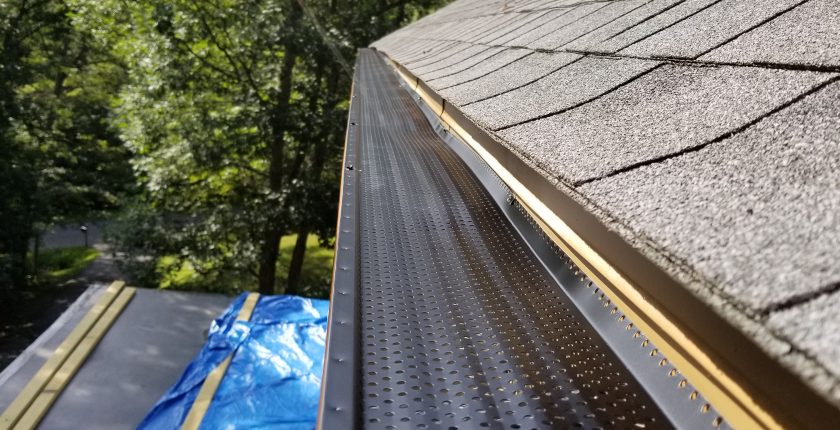4 Best Ways to Solve Residential Gutter Blockages
Maintaining free-flowing gutters is crucial to home maintenance. However, residential gutters frequently suffer blockages due to debris accumulation. This article explores four effective solutions to combat this issue: routine gutter cleaning, installation of gutter guards, use of specialized gutter tools, and engaging professional gutter services. Each method will be analyzed in depth to provide homeowners with comprehensive, actionable advice to effectively prevent and resolve gutter blockages.
Regular Gutter Cleaning
The implementation of regular gutter cleaning is a proactive measure homeowners can take to prevent residential gutter blockages. This maintenance task is essential to the longevity of a home’s infrastructure, preventing water damage that could lead to costly repairs. By removing debris such as leaves, twigs, and other detritus, regular gutter cleaning ensures water can flow freely, reducing the risk of overflow and subsequent damage to a home’s foundation. Moreover, it also discourages pests like rodents and insects from nesting in your gutters, further protecting your property. It is recommended that homeowners clean their gutters at least twice a year, in late spring and early fall, to keep them functioning optimally and maintain the structural integrity of their homes.
Installation of Gutter Guards
Moving on to another effective solution, installing gutter guards can significantly cut down on blockages by preventing large debris from entering the gutters. These guards serve as a protective layer and are especially beneficial during autumn when leaves tend to clog gutters.
Here are three key benefits:
- Reduced Maintenance: Gutter guards minimize the need for frequent cleaning by keeping out large debris, thereby saving homeowners time and effort.
- Prevention of Rust: By preventing wet debris from sitting in the gutter, guards can help delay the onset of rust.
- Avoiding Blockages: Guards can prevent the build-up that often leads to water overflow, protecting your home from potential water damage and reducing the need for water damage waterproofing measures
Therefore, the installation of gutter guards is a proactive step towards hassle-free gutter maintenance.
Use of Gutter Tools
In addition to installing gutter guards, utilizing specialized gutter tools serves as another effective strategy in combating residential gutter blockages. These tools, designed specifically for gutters, can help homeowners to effectively maintain the cleanliness and functionality of their gutters.
A gutter scoop, for instance, allows for the removal of leaves, twigs, and other debris, preventing them from causing blockages. A gutter brush can be used to dislodge stubborn grime and deposits that stick to the gutters’ interior walls. Gutter flushers and cleaners, meanwhile, are tools which use water pressure to clear out clogged gutters.
Professional Gutter Services
Beyond the use of specialized gutter tools, seeking the assistance of professional gutter services is another highly effective method to address residential gutter blockages. These services bring a wealth of experience and a deep understanding of gutters, which ensures a thorough and effective solution.
Here are three benefits of hiring professional gutter services:
- Expertise: They have the knowledge to correctly identify the cause of the blockage and the most effective way to resolve it.
- Equipment: Professionals come equipped with advanced tools that can tackle even the most stubborn blockages.
- Maintenance: Regular professional cleaning can prevent future blockages, saving homeowners time and money in the long run.
Additionally, proper roof cleaning practices significantly impact gutter performance, as clean roofs shed fewer materials into the gutter system, reducing blockage frequency and severity.
Frequently Asked Questions
What Types of Trees Around My House Are Most Likely to Cause Gutter Blockages?
Trees most likely to cause gutter blockages include those with small, dense foliage or those that shed their leaves annually. Examples include pine, oak, maple, and elm trees. Pine trees can cause blockages due to their small needles, while oak, maple, and elm trees can shed large quantities of leaves. Regular maintenance, such as trimming overhanging branches and cleaning gutters seasonally, can prevent blockages caused by tree debris.
How Can I Identify if There Is a Blockage in My Gutters Without Climbing a Ladder?
Identifying gutter blockages can be achieved without using a ladder. Look for signs such as water spilling over the sides during rain, damp walls, or water stains on your home’s siding. Additionally, an increase in the number of pests around your home could indicate stagnant water in blocked gutters. A professional gutter cleaning service can provide a definitive assessment if you’re unsure.
Are There Any DIY Solutions to Prevent Gutter Blockages?
Yes, there are several DIY solutions to prevent gutter blockages. Regular cleaning is essential. Utilize a long-handled gutter cleaning tool to remove debris from the ground. Additionally, consider installing gutter guards or screens to keep leaves and other debris out. Downspout strainers can also be helpful. Remember, it’s crucial to check and clean the gutters after heavy storms as this is when most blockages occur.
How Do Gutter Blockages Affect the Overall Health of My House’s Foundation?
Gutter blockages can have a detrimental impact on the health of your house’s foundation. When gutters are blocked, water overflows and pools around the foundation. Over time, this can lead to significant damage including cracks and instability. Additionally, the increased moisture can promote the growth of mold and mildew, posing health risks. Therefore, regular gutter maintenance is crucial to preserve the structural integrity of your home.
Can Gutter Blockages Attract Pests or Rodents to My Property?
Yes, gutter blockages can attract pests and rodents to your property. Blocked gutters often accrue stagnant water and organic debris, creating an ideal environment for pests such as mosquitoes, rats, and mice. Additionally, insects like termites and carpenter ants may be drawn to the decaying leaves and wood. Therefore, maintaining clean gutters is essential not only for preventing structural damage, but also for minimizing potential pest infestations.

